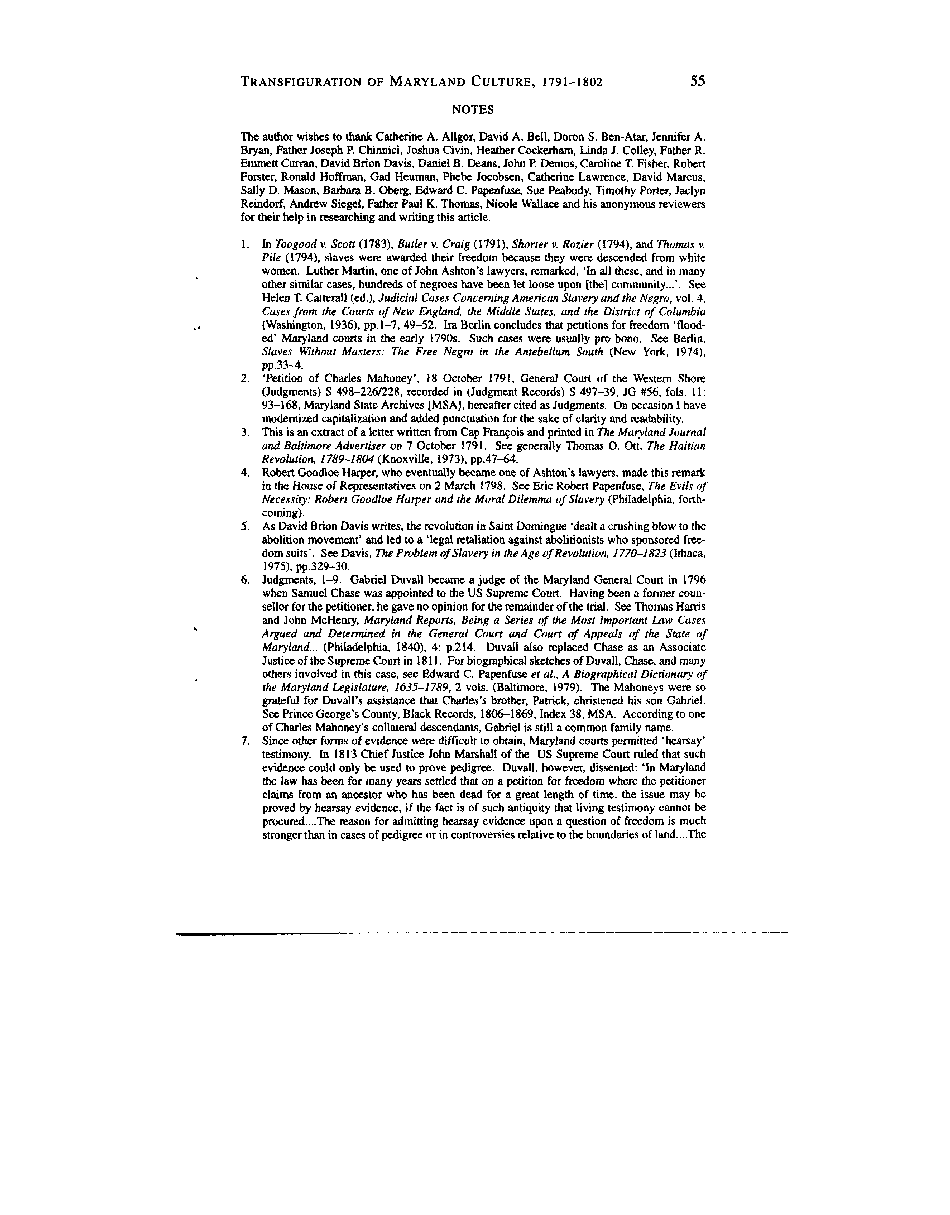|
TRANSFIGURATION OF MARYLAND CULTURE, 1791-1802 55
NOTES
The author wishes to thank Catherine A. Allgor, David A. Bell, Doron S. Ben-Atar, Jennifer A.
Bryan, Father Joseph P. Chinnici, Joshua Civin, Heather Cockerham, Linda J. Colley, Father R.
Emmett Curran, David Brion Davis, Daniel B. Deans, John P. Demos, Caroline T. Fisher, Robert
Forster, Ronald Hoffman, Gad Heuman, Phebe Jocobsen, Catherine Lawrence, David Marcus,
Sally D. Mason, Barbara B. Oberg, Edward C. Papenfuse, Sue Peabody, Timothy Porter, Jaclyn
Reindorf, Andrew Siegel, Father Paul K. Thomas, Nicole Wallace and his anonymous reviewers
for their help in researching and writing this article.
1. In Toogood v. Scott (1783), Butler v. Craig (1791), Shorter v. Rozier (1794), and Thomas v.
Pile (1794), slaves were awarded their freedom because they were descended from white
women. Luther Martin, one of John Ashton's lawyers, remarked, 'In all these, and in many
other similar cases, hundreds of negroes have been let loose upon [the] community...'. See
Helen T. Catterall (ed.), Judicial Cases Concerning American Slavery and the Negro, vol. 4,
Cases from the Courts of New England, the Middle States, and the District of Columbia
(Washington, 1936), pp.1-7, 49-52. Ira Berlin concludes that petitions for freedom 'flood-
ed' Maryland courts in the early 1790s. Such cases were usually pro bono. See Berlin,
Slaves Without Masters: The Free Negro in the Antebellum South (New York, 1974),
pp.33-4.
2. 'Petition of Charles Mahoney', 18 October 1791, General Court of the Western Shore
(Judgments) S 498-226/228, recorded in (Judgment Records) S 497-39, JG #56, fols. 11:
93-168, Maryland State Archives [MSA], hereafter cited as Judgments. On occasion I have
modernized capitalization and added punctuation for the sake of clarity and readability.
3. This is an extract of a letter written from Cap Francois and printed in The Maryland Journal
and Baltimore Advertiser on 7 October 1791. See generally Thomas O. Ott, The Haitian
Revolution, 1789-1804 (Knoxville, 1973), pp.47-64.
4. Robert Goodloe Harper, who eventually became one of Ashton's lawyers, made this remark
in the House of Representatives on 2 March 1798. See Eric Robert Papenfuse, The Evils of
Necessity: Robert Goodloe Harper and the Moral Dilemma of Slavery (Philadelphia, forth-
coming).
5. As David Brion Davis writes, the revolution in Saint Domingue 'dealt a crushing blow to the
abolition movement' and led to a 'legal retaliation against abolitionists who sponsored free-
dom suits'. See Davis, The Problem of Slavery in the Age of Revolution, 1770-1823 (Ithaca,
1975), pp.329-30.
6. Judgments, 1-9. Gabriel Duvall became a judge of the Maryland General Court in 1796
when Samuel Chase was appointed to the US Supreme Court. Having been a former coun-
sellor for the petitioner, he gave no opinion for the remainder of the trial. See Thomas Harris
and John McHenry, Maryland Reports, Being a Series of the Most Important Law Cases
Argued and Determined in the General Court and Court of Appeals of the State of
Maryland... (Philadelphia, 1840), 4: p.214. Duvall also replaced Chase as an Associate
Justice of the Supreme Court in 1811. For biographical sketches of Duvall, Chase, and many
others involved in this case, see Edward C. Papenfuse et al., A Biographical Dictionary of
the Maryland Legislature, 1635-1789, 2 vols. (Baltimore, 1979). The Mahoneys were so
grateful for Duvall's assistance that Charles's brother, Patrick, christened his son Gabriel.
See Prince George's County, Black Records, 1806-1869, Index 38, MSA. According to one
of Charles Mahoney's collateral descendants, Gabriel is still a common family name.
7. Since other forms of evidence were difficult to obtain, Maryland courts permitted 'hearsay'
testimony. In 1813 Chief Justice John Marshall of the US Supreme Court ruled that such
evidence could only be used to prove pedigree. Duvall, however, dissented: 'In Maryland
the law has been for many years settled that on a petition for freedom where the petitioner
claims from an ancestor who has been dead for a great length of time, the issue may be
proved by hearsay evidence, if the fact is of such antiquity that living testimony cannot be
procured....The reason for admitting hearsay evidence upon a question of freedom is much
stronger than in cases of pedigree or in controversies relative to the boundaries of land....The
�
|

